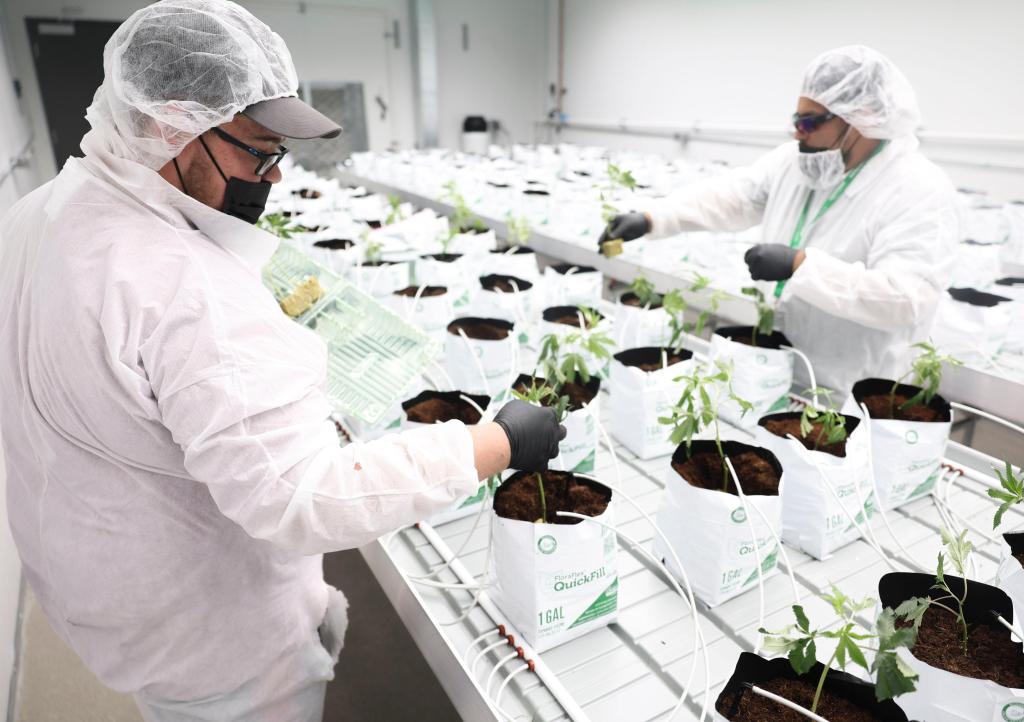
After long delays, new cannabis businesses are opening in Illinois with a vow to help others along the way – The Denver Post
[ad_1]

Five years after starting the process, Dan Pettigrew finally has opened his first cannabis store in Illinois.
Pettigrew is the co-founder of Viola CHI with former NBA star Al Harrington, following years of operation by Viola Brands in Colorado, Michigan and other states.
But Illinois was much harder to break into. Controversy and lawsuits over the application process delayed new licenses. Then a perfect storm of supply chain breakdowns, high costs and interests rates combined with poor stock market performance to drive investors away.
As a result, newcomers have struggled to open here while state laws have allowed large multistate operators to keep the market largely to themselves, resulting in the highest prices in the nation.
“There’s this pie-in-the-sky notion that everybody’s gonna get rich,” Pettigrew said. “There will be a lot of wealth created, but it’s expensive and competitive and extremely challenging.”
Existing medical cannabis growers and dispensaries were allowed to begin recreational sales in 2020. Since then, startups had to wait through multiple delays until 192 initial new licenses were issued with preference for veterans and social equity applicants, generally defined as those coming from poor areas with high arrest rates, or with prior minor cannabis convictions.
As of mid-July, just 27 of those new social equity businesses have opened, due mainly to license holders being unable to get financing. The few that are launching had two key advantages that many others did not: experience and money. Now, those that are opening promise to work together with other startups.
Pettigrew and Harrington — who played for seven teams in the NBA, including Denver, until 2014 — were old friends from Chicago, and started Viola Brands in Colorado in 2011 after Harrington’s grandmother, Viola, used cannabis to help her glaucoma. It’s grown to what they believe is the largest legal Black-owned cannabis company in the United States.
Using their experience and capital from other states, they raised about $5 million from a team of minority investors. Partnering with friend and military veteran Al Lomax to qualify for social equity status, the team opened their retail store Wednesday in Broadview, near VA Hines Health Care.
Once they get approval in Chicago, they plan to open a second store on the site of a former emissions testing facility on Webster Avenue in Lincoln Park, where they plan for customers to drive into the building and buy products without leaving their vehicles.
Viola also has a pending lawsuit against the state of Illinois, claiming that their application got a perfect score and should be awarded a craft cultivation license.
Viola‘s stated mission is to increase equity by working with other Black and brown vendors. In Illinois, that will include new craft growers, Pettigrew said.
“A lot of craft products will be hidden gems,” Pettigrew said. “We’ll give those businesses an opportunity.”
One of those Black-owned growers, Umi Farms, is scheduled to start growing cannabis this month at its 66,000-square-foot warehouse in Rolling Meadows, with hopes to open its first retail store in the old Salt and Pepper diner in Lincoln Park by the end of the year.
Its cannabis brand Lab 11 is launching sales of vapes and pre-rolls at newer independent dispensaries this summer.
Umi co-founder and CEO Akele Parnell, a corporate attorney and former employee of industry giant Green Thumb Industries, said he hopes to help other Black-owned marijuana businesses, while also getting sold at large chain stores that so far sell few Black-owned brands.
“We want to take people back to that feeling of their first high,” he said.
In Wheeling, where Okay Cannabis opened in February, it now has opened one of the state’s first dispensary consumption lounges where people can smoke. With a West Town Bakery and bar under the same roof, owners say they offer a relaxing atmosphere for drop-in visits or planned events.
Okay held promotional events in the lounge this past week, and has plans to hold dinners with cannabis consumption. It also has a store in West Town and plans to open one near the CTA station on Howard Street in Evanston by year’s end.
“We’re trying to infuse the hospitality industry into the cannabis industry,” said Scott Weiner, co-founder of Fifty/50 Restaurant Group, which owns the West Town Bakery. “We’ve been trying to normalize this industry for people who don’t use cannabis every day. We’re trying to create an experience.”
One of the newest growers is Oregonix Farms, in a warehouse on a farm in far northwest suburban Huntley. Oregonix recently started growing clones — small cuttings from other plants — for its first craft cannabis crop.
CEO David Schwimmer — no, not the one from “Friends” — used the money he got as the founder of VistaNational Insurance Group in Oak Brook and obtained financing to launch the business. He bought out social equity partner and veteran Johnny Johnson. Chief Operating Officer Owen Papworth said they’ve brought experience from growing in Oregon and built a Ferrari-quality facility to produce high-end cannabis.
Andrew Wise, director of cultivation, showed off rooms with computer-controlled temperature, humidity, and water-fed nutrients, grown soilless in a coconut medium, similar to hydroponics. The company went so far as to order new shoes for employees to wear only in the grow house to avoid bringing in contamination.
Schwimmer hopes eventually to partner with dispensary owners to create a vertically integrated business, in which he both grows weed wholesale and sells it in retail stores.
Stash Holdings Corp. also announced the opening of two new recreational cannabis stores, in Orland Hills and Peru, on Friday. Stash is headquartered in California, with a team of former executives of MedMen, Chai Cannabis Co. and Captor Capital.
The difficulty in opening new stores in Illinois is reflected in a new report from Headset that Illinois has the least competition among cannabis brands of any state with legal cannabis, with just 118 brands, compared with more than 1,000 in some other states.
As a result, Illinois’ market is the most concentrated, with 68% of sales coming from the top 10 brands. And Illinois has the third-highest sales of vertically integrated sales, in which large chains grow and sell their own products 27% of the time.
State officials promise that greater diversity is coming slowly but surely to the industry, blaming COVID and litigation for previous delays. A simplified online application process attracted nearly 2,700 applicants for 55 additional adult-use retail licenses that were issued this summer.
After a previous loan program failed to distribute much money, the state created a $40 million fund to offer cannabis startups low-interest loans, which officials hope will get more newcomers off the ground.
()
[ad_2]
Source link




